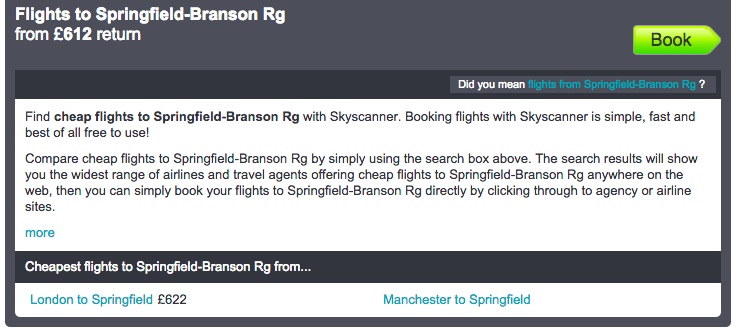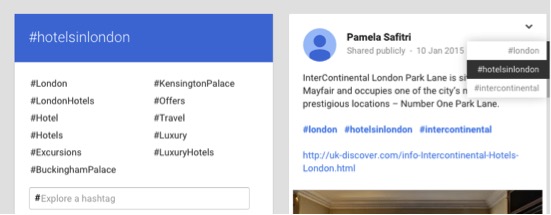Inspiring Keyword Research Ideas For Travel Brands
Brands must understand what people are looking for and provide content that inspires them.


There is huge potential to win travelers with amazing content. But because the travel industry is incredibly competitive, we’ve tended to create keyword-rich “robotic” types of content rather than content users will find exciting – or at least informative.
Why wouldn’t we do this? Optimizing content for Google, rather than people, has always worked. Until now.
Keyword Research Is Evolving
Ever since there was a need to optimize our pages for search engines we all have advocated that “content is king” in one way or another. We surrendered ourselves to the power of the keywords we were optimizing our pages for, sometimes so much so that it sounded like our content was written by the robot from “Lost in Space”.
We optimized our pages for Google and it worked. We used keywords Google itself provided to us through many different tools (e.g., Keyword Planner, Analytics, Trends, Webmaster Tools) to create content that essentially told Google, “Hey, our content is exactly what your users are looking for.”
We thought that’s what Google wanted. But by doing this, we completely ignored what real people wanted. Users weren’t happy, and Google took notice.
For the past few years Google has tried to put its users first, through a series of algorithmic and technological updates, and by removing keyword data from Google Analytics.
Goodbye Keywords, Hello People
One of the final blows to our old style keyword research was Google’s Hummingbird update. Google now looks at the user intent when performing a search rather than the semantic meaning of the words used in the search.
This means that when the user types “Hotels in London” Google analyzes several factors to determine whether the user is looking to book a hotel, a list of all the hotels in London, or even what type of hotel they are looking for in London. Search results may differ from one user to another as long as their perceived search intent is different.
In Google took the unimaginable step of reducing the organic visibility of some of the biggest sites including some in the travel industry. These sites all had one thing in common: thin content.
The message to brands and businesses was clear. You have to create content for people, not for keywords.
And brands got the message. No site is infallible. You have to take Google’s rules seriously.
Google is pushing us to actually listen to our users/visitors to understand what they are really looking for.
What Is Inspiring Travel Content?
You can find plenty of examples of uninspiring travel content. For instance, almost every major travel brand uses the following technique, illustrated by Skyscanner, to populate the web with thousands of pages of uninspired content.

So, what is inspiring content? It answers a question, creates an emotional response, or triggers an action from the person consuming it.
One great example is Samsung’s campaign for the Gear VR, a cool, futuristic device that seemed to have all the chances of ending up in the Google Glass corner. I failed to see the practical use of Samsung’s Gear VR, but a few days ago this campaign caught my attention:
Immediately I was inspired to think of the thousand possible uses for it (hint: it would go perfectly well with the project I’m going to mention next).
One of my ultimate attempts to create inspiring content while working for Expedia was the Expedia Pioneer Project, where we selected people to travel around their own country for a year. They had to create articles, take photos, and make video content at each destination they visited.
Their itineraries were defined primarily by a keyword research, which defined which destinations were priorities.
This inspiring content has worked really well for Expedia and has been extremely well received. There’s nothing more inspiring in travel than seeing someone experiencing what you would like to experience.
Take, for example, Albacete. This destination in Spain has a reputation of being somewhat boring. Look at the following video created by Raul, one of the two Pioneers for Spain:
After watching the video, Albacete seems like a destination worth visiting. In fact, after publishing this video both the official tourism organization of Albacete and a local music group asked Raul to collaborate with them in their video content.
What Is Proper Keyword Research Now?
Keyword research starts with you listening to what the users are actually looking for. Not any user, but the users who might consume your products or the information that you provide on your site.
People are no longer cryptic when searching in Google. They use complicated sentences that may not amount to a big search volume but, when added up, they become the actual quality traffic you’re looking for.
If we go back to the previous example, Samsung answers one important question (what’s the use of the Samsung Gear VR?) with inspiring content that triggers an emotion. But how do we find out about those questions?
Social media is one way of doing keyword research. Up until now we have either misused or disregarded social media’s part in our SEO strategy.
Social media is generally used either as a customer service outlet or as a way to spread authority about a subject. But social media is the most direct way to find out what your users expect from you by simply asking them directly. Be active, not just reactive, in social media.
Keyword Research Tools
There is still some use for the usual tools such as Google Keyword Planner, but only as the starting point of a much more sophisticated process.
Once you have a target list, find out what kind of content your target users are really looking for, which brings us to the relationship between social media and SEO:
- Social media is the new Keyword Planner: Travel content is heavily shared on social media. Monitor the hashtags of your top targeted keywords, both in Twitter and Google+, to get a better understanding of your users’ intent. Build the content they are actually looking for and again listen to what they have to say about it.

- Google predictive search and related searches: Google provides this information to provide users with a more pleasant and effective search experience.

The Content Beyond Words
The results of this research might give you information beyond the subject of the content but also provide the type of content your users are looking for, whether this is text, video, or images. Let the research tell you what they need.
As a consequence of this new approach to your research, you will have to involve whoever builds your content more than before. Help them understand what your users need rather than providing them with just a bunch of keywords to play with.
Always remember: potential travelers are looking to be inspired and expect a certain type of experience. Whether it’s for leisure, business, or another type of travel, you need to understand what your potential customers are looking for and provide content that will inspire them.
Perhaps we all should better go back to reading those old inspiring books and learn from them. Creating inspiring content can no longer be done by using the same old keyword research techniques of days gone by.

